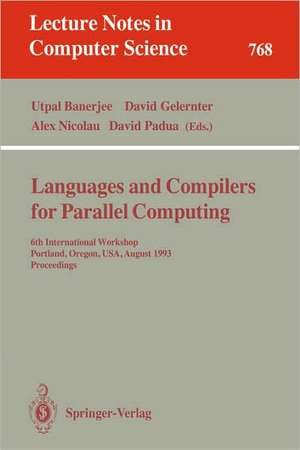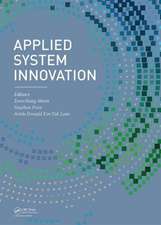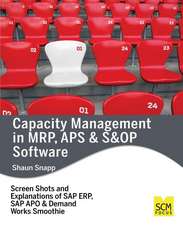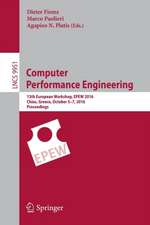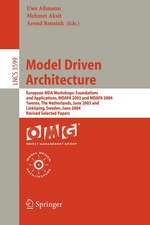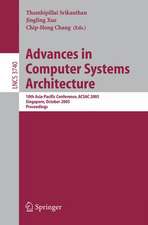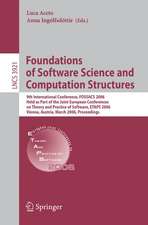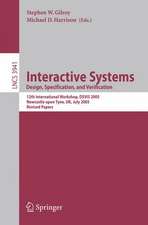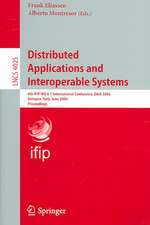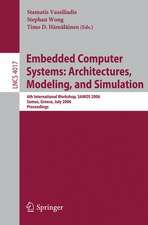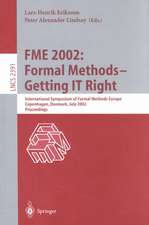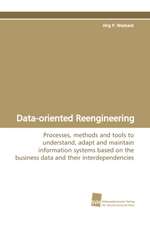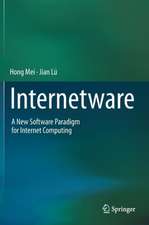Languages and Compilers for Parallel Computing: 6th International Workshop, Portland, Oregon, USA, August 12 - 14, 1993. Proceedings: Lecture Notes in Computer Science, cartea 768
Editat de Utpal Banerjee, David Gelernter, Alex Nicolau, David Paduaen Limba Engleză Paperback – 28 ian 1994
| Toate formatele și edițiile | Preț | Express |
|---|---|---|
| Paperback (3) | 339.47 lei 6-8 săpt. | |
| Springer Berlin, Heidelberg – 22 apr 1992 | 339.47 lei 6-8 săpt. | |
| Springer Berlin, Heidelberg – 8 dec 1993 | 347.08 lei 6-8 săpt. | |
| Springer Berlin, Heidelberg – 28 ian 1994 | 664.11 lei 6-8 săpt. |
Din seria Lecture Notes in Computer Science
- 20%
 Preț: 1061.55 lei
Preț: 1061.55 lei - 20%
 Preț: 307.71 lei
Preț: 307.71 lei - 20%
 Preț: 438.69 lei
Preț: 438.69 lei - 20%
 Preț: 645.28 lei
Preț: 645.28 lei -
 Preț: 410.88 lei
Preț: 410.88 lei - 15%
 Preț: 580.46 lei
Preț: 580.46 lei - 17%
 Preț: 427.22 lei
Preț: 427.22 lei - 20%
 Preț: 596.46 lei
Preț: 596.46 lei -
 Preț: 449.57 lei
Preț: 449.57 lei - 20%
 Preț: 353.50 lei
Preț: 353.50 lei - 20%
 Preț: 1414.79 lei
Preț: 1414.79 lei - 20%
 Preț: 309.90 lei
Preț: 309.90 lei - 20%
 Preț: 583.40 lei
Preț: 583.40 lei - 20%
 Preț: 1075.26 lei
Preț: 1075.26 lei - 20%
 Preț: 310.26 lei
Preț: 310.26 lei - 20%
 Preț: 655.02 lei
Preț: 655.02 lei - 20%
 Preț: 580.93 lei
Preț: 580.93 lei - 20%
 Preț: 340.32 lei
Preț: 340.32 lei - 18%
 Preț: 938.83 lei
Preț: 938.83 lei - 20%
 Preț: 591.51 lei
Preț: 591.51 lei - 15%
 Preț: 438.59 lei
Preț: 438.59 lei - 20%
 Preț: 337.00 lei
Preț: 337.00 lei -
 Preț: 389.48 lei
Preț: 389.48 lei - 20%
 Preț: 607.39 lei
Preț: 607.39 lei - 20%
 Preț: 1024.44 lei
Preț: 1024.44 lei - 20%
 Preț: 579.30 lei
Preț: 579.30 lei - 20%
 Preț: 763.23 lei
Preț: 763.23 lei - 20%
 Preț: 453.32 lei
Preț: 453.32 lei - 20%
 Preț: 575.48 lei
Preț: 575.48 lei - 20%
 Preț: 585.88 lei
Preț: 585.88 lei - 20%
 Preț: 825.93 lei
Preț: 825.93 lei - 20%
 Preț: 763.23 lei
Preț: 763.23 lei - 17%
 Preț: 360.19 lei
Preț: 360.19 lei - 20%
 Preț: 1183.14 lei
Preț: 1183.14 lei - 20%
 Preț: 340.32 lei
Preț: 340.32 lei - 20%
 Preț: 504.57 lei
Preț: 504.57 lei - 20%
 Preț: 369.12 lei
Preț: 369.12 lei - 20%
 Preț: 583.40 lei
Preț: 583.40 lei - 20%
 Preț: 343.62 lei
Preț: 343.62 lei - 20%
 Preț: 350.21 lei
Preț: 350.21 lei - 20%
 Preț: 764.89 lei
Preț: 764.89 lei - 20%
 Preț: 583.40 lei
Preț: 583.40 lei - 20%
 Preț: 649.49 lei
Preț: 649.49 lei - 20%
 Preț: 341.95 lei
Preț: 341.95 lei - 20%
 Preț: 238.01 lei
Preț: 238.01 lei - 20%
 Preț: 538.29 lei
Preț: 538.29 lei
Preț: 664.11 lei
Preț vechi: 830.14 lei
-20% Nou
Puncte Express: 996
Preț estimativ în valută:
127.07€ • 133.03$ • 105.15£
127.07€ • 133.03$ • 105.15£
Carte tipărită la comandă
Livrare economică 05-19 aprilie
Preluare comenzi: 021 569.72.76
Specificații
ISBN-13: 9783540576594
ISBN-10: 3540576592
Pagini: 676
Ilustrații: XIII, 655 p.
Dimensiuni: 155 x 235 x 35 mm
Greutate: 0.93 kg
Ediția:1994
Editura: Springer Berlin, Heidelberg
Colecția Springer
Seria Lecture Notes in Computer Science
Locul publicării:Berlin, Heidelberg, Germany
ISBN-10: 3540576592
Pagini: 676
Ilustrații: XIII, 655 p.
Dimensiuni: 155 x 235 x 35 mm
Greutate: 0.93 kg
Ediția:1994
Editura: Springer Berlin, Heidelberg
Colecția Springer
Seria Lecture Notes in Computer Science
Locul publicării:Berlin, Heidelberg, Germany
Public țintă
ResearchCuprins
Early experiences with Olden.- Arbitrary order operations on trees.- Analysis of dynamic structures for efficient parallel execution.- On automatic data structure selection and code generation for sparse computations.- Synchronization issues in data-parallel languages.- ZPL: An array sublanguage.- Event-based composition of concurrent programs.- Adaptive parallelism on multiprocessors: Preliminary experience with Piranha on the CM-5.- Slicing analysis and indirect accesses to distributed arrays.- Do&Merge: Integrating parallel loops and reductions.- Automatic support for data distribution on distributed memory multiprocessor systems.- A compilation approach for Fortran 90D/HPF compilers.- A framework for exploiting data availability to optimize communication.- The alignment-distribution graph.- An overview of a compiler for scalable parallel machines.- Toward a compile-time methodology for reducing false sharing and communication traffic in shared virtual memory systems.- Program transformation for locality using affinity regions.- Maximizing loop parallelism and improving data locality via loop fusion and distribution.- Align and distribute-based linear loop transformations.- Extending software pipelining techniques for scheduling nested loops.- A methodology for generating efficient disk-based algorithms from tensor product formulas.- Loop transformations for Prolog programs.- A multithreaded implementation of Id using P-RISC graphs.- Acceleration of first and higher order recurrences on processors with instruction level parallelism.- Efficient compile-time/run-time contraction of fine grain data parallel codes.- VISTA: The Visual Interface for Scheduling Transformations and Analysis.- Efficiently computing ?-nodes on-the-fly.- Construction of thinned gatedsingle-assignment form.- Automatic array privatization.- FIAT: A framework for interprocedural analysis and transformation.- An exact method for analysis of value-based array data dependences.- Symbolic analysis: A basis for parallelization, optimization, and scheduling of programs.- Towards a non-intrusive approach for monitoring distributed computations through perturbation analysis.- Efficient computation of precedence information in parallel programs.- Trace size vs parallelism in trace-and-replay debugging of shared-memory programs.- Parallel Program Graphs and their classification.
